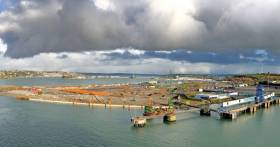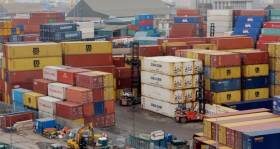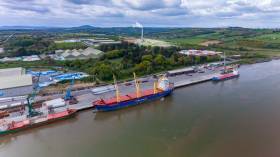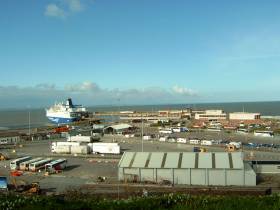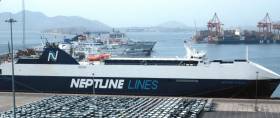Displaying items by tag: Rosslare Europort
#ferries - Irish Ferries cruiseferry Oscar Wilde which operated Rosslare based routes to France until last year has according to owners Irish Continental Group to be disposed following an agreement to sell the 1987 built ship to a new owner.
Under the terms of a bareboat hire purchase agreement, ICG has agreed to sell the Oscar Wilde to MSC Mediterranean Shipping Company SA.
The Swiss based group Afloat adds is a major player in the global container market and has divisions involved in cruiseships and ferries serving in the Mediterranean Sea.
The total gross consideration for the sell of Oscar Wilde is €28.9 million, payable in instalments over 6 years, is to take up to 2025. Delivery to the buyer of the 1,400 passenger/580 car capacity cruiseferry is expected to take place during April 2019.
As for Rosslare Europort based routes to France this season, Irish Ferries have yet to confirm with an update following a decision in December that they were unlikely to operate a service between Rosslare and France in 2019 but added then this situation was under review.
Kronprins Harald was acquired by ICG from Norwegian operator Color Line in 2007 to begin a Irish Ferries career on the French services to Cherbourg and Roscoff. Since Autumn last year, the ship was transferred to Dublin to provide cruiseferry services on the Cherbourg route in advance of the much delayed newbuild W.B. Yeats. This much larger cruiseferry entered service on the direct Dublin-France route almost a month ago.
The proceeds according to ICG less the net book value of the Oscar Wilde (€7.7 million) and related disposal costs will result in a profit on disposal. It said this will be reported as part of the 2019 financial results of ICG.
#portofCork - One or two ferry services, reports The Irish Times, could be run through the Port of Cork to the UK should a no-deal Brexit lead to congestion at Dublin Port, according to the executive of the southern port.
Brendan Keating, Port of Cork chief executive, said the port could handle a ferry service or two to the UK – most likely to Fishguard, Swansea or Bristol for eight to 12 weeks after a no-deal Brexit – but said the port would need more than €500,000 to make the necessary preparations, depending on traffic volumes.
“All we can do is plan for the worst scenario and, in that context, if a hard Brexit comes to pass we can step up to the plate and facilitate an additional service or two,” Mr Keating said.
Department of Transport briefing papers identify Rosslare Europort and the Port of Cork at Ringaskiddy to be used potentially to take roll-on, roll-off (RoRo) lorry traffic from Dublin Port, which handles more than 85 per cent of the country’s road freight, should checks in a no-deal scenario lead to a backlog.
For further reading on Contingency Plans click here.
Emergency Orders to Be Used by State for Brexit Checkpoints
#irishports - The State faces legal and logistical complications in managing a crash-out Brexit and is relying on emergency orders to bypass normal planning procedures to prepare, internal Government documents reveal.
As The Irish Times reports, work on a wide variety of transport issues in the event of a hard Brexit – ranging from assessing the legality of the State leasing ships to safeguard supplies, to reviewing whether Rosslare Port can take private investment – are disclosed in briefing papers prepared for Minister for Transport Shane Ross and released under the Freedom of Information (FoI) Act.
The Government has ruled out leasing ships, taking ownership of, or running, ferries in the event that the British “landbridge” route to mainland Europe is affected by Brexit because it “could give rise to claims of interference in the market” and complaints under State aid rules from shipping companies, the papers say.
To read more on what the Department of Transport has to say click here.
Plan by Government to Buy Land at Ports in Event of Hard Brexit
#IrishPorts - Plans to acquire port land the Government have said at Dublin Port and Rosslare is in order to prevent congestion caused by any new custom checks, in the event of a no-deal Brexit.
According to RTE News, the Government's contingency plan for a no-deal Brexit was published this evening (Wed, 19 Dec)
The document identifies 19 sectors in which action will be taken should the UK leave the European Union next March without a comprehensive agreement.
Under a chapter entitled 'Next Steps', the Government said it will prioritise "no-deal planning" at its next Cabinet meeting on 3 January.
It will also seek to introduce in the following weeks "necessary legislative measures" which would be required in a no deal scenario.
In a blunt introduction, the paper predicts "a no deal Brexit would potentially involve severe macroeconomic, trade and sectoral impacts [for Ireland]".
It continues: "Grappling with the enormous range of impacts both in the immediate short term and in the longer term will involve difficult and significant choices of a practical, strategic and political nature."
To read more including a comment from Tánaiste Simon Coveney, click here.
W.B. Yeats to Arrive Today in Rosslare Where 'Europort' Is Centre Stage to Minister's Reaction on Irish Ferries Announcement
#ferry - Irish Ferries W.B. Yeats inaugural call to France yesterday for berthing trials in advance of starting service from Dublin in 2019, is to be followed today with a call to Rosslare Europort before finally completing the maiden delivery voyage to the capital, writes Jehan Ashmore.
The €144m cruiseferry built in Germany for parent company Irish Continental Group (ICG), was originally to begin service this summer. Delays by contractors supplying the shipyard, caused much disruption to high-season holidaymakers, that led to a revised entry of service on the Dublin-Cherbourg route now scheduled for mid-March.
Despite yesterday's facebook announcement from Irish Ferries to inform customers that they are unlikely to operate a service between Rosslare and France in 2019, Afloat adds according to online tracking, the Cypriot flagged W.B. Yeats is scheduled to arrive in Rosslare Europort at around 12 noon today.
The call by the new cruiseferry is to enable berthing trials and is no doubt just a practical exercise to cover all contingency scenarios across the company's route network.
Minister's Response on Rosslare routes future
In response to the announcement, a statement was issued late last night from the Minister of State for Tourism and Sport, Brendan Griffin TD regarding Irish Ferries Rosslare service. "I note Irish Ferries' communication this evening regarding their Rosslare service.
The service is an important transport service for the South East region. From a tourism perspective, while it mainly facilitates Irish tourists holidaying in France, it also brings French and other European tourists to the South East region.
Given the importance of these services, I have asked my officials to engage with the company."
Afloat adds if the outcome of no Rosslare based service arises in 2019, the Europort however will maintain direct links to mainland Europe as Stena Line operate a Rosslare-Cherbourg service.
Competition however could arise (taking the place of Irish Ferries), as according to The Irish Times yesterday, an operator already serving between Ireland and the UK, has approached the Wexford port to consider a service given the potential of a post-Brexit and thus releasing pressure out of Dublin Port. The capital's port is notably where 80% of freight from Ireland currently goes through the port via the UK landbridge with onward links chiefly through Dover to mainland Europe.
For further related coverage albeit from yesterday, including reaction from the Irish haulage sector, click here.
Historical Backgound
The south-east port is where Irish Ferries has operated established routes to France for decades, as the Cherbourg service is a legacy of predecessor Irish Continental Line (ICL) having been launched in 1978. The route to Normandy was followed with a service to Roscoff in neighbouring Brittany but opened by the current operator in 1995, however services including those connecting Cork had ceased before 1998.
In that year, a single ship took over both the remaining Rosslare based routes on the direct Ireland-France routes when the 1982 built Normandy was introduced, but the ageing ferry was eventually replaced by current cruiseferry, Oscar Wilde.
As for the year-round operated route from Rosslare to Cherbourg, this ended prematurely this year, having taken place several months ago. This was a strategic move by the operator, as the Rosslare based cruiseferry Oscar Wilde was redeployed to assist ropax Epsilon on the Dublin-Cherbourg route, given the delay of W.B. Yeats that was to enter during the summer months serving Normandy.
The second route out of Rosslare, to Roscoff in neighbouring Brittany, however was based on a seasonal only basis.
Should both routes not resume service in 2019, this would mark the end of an association of direct passenger and freight links between Ireland and France. The company can trace its origins through predecessors that began the first direct continental service launched 50 years ago, albeit between Rosslare and Le Havre in 1968.
So what next awaits the future of Oscar Wilde? given the former Scandinavian ship was launched 31 years ago.
Ports of Waterford and Rosslare Can “Counterbalance” Dublin
#CounterPorts - It is the belief of management at the Ports of Waterford and Rosslare Europort that they can become ‘valuable counterpoints’ to reduce congestion in the Dublin area while also supporting a ‘robust and pragmatic’ response to Brexit.
The ports have made a joint submission writesThe Munster Express to the South East Chambers of Commerce’s final submission to the National Planning Framework (NPF – ‘Ireland 2040 – Our Plan’) which is set to guide planning over the next 20 years.
“The south east ports together provide a full range of services to the South-East region and beyond. Rosslare Europort and Waterford (Belview) are Tier 2 Ports of National Significance and are Comprehensive Ports on the Ten-T network,” they state in their submission. “The ports have Ro-Ro, Lo-Lo, bulk and passenger services/facilities with excellent road/rail connectivity and direct links to the UK and the continent. These ports have some areas of under-utilised capacity and significant scope for the expansion of freight services.”
The report adds: “In the context of some of the challenges posed by Brexit, the South East can offer a platform for solutions that bypass the UK land bridge with little or no upfront investment.
N19S1Pic1
“Similarly, the opportunity is there to reduce freight road miles and related CO2 emissions while taking some pressure off of Dublin’s road and port infrastructure. We submit that the south east ports have a very significant role to play in the economic development of the south east and that this role is equivalent to that performed by the Tier 1 Ports (Dublin, Cork and Shannon Foynes) for their respective regions.”
To read more on this story, click the link here.
Container With Eight People Found in Rosslare Europort
#ferry - A container was discovered to have eight people inside when it arrived on a ferry into Rosslare Europort in Co Wexford.
The four adults, two teenagers and two children according to RTE are all reported to be safe.
They were discovered after the Stena Line ferry from Cherbourg to Rosslare docked yesterday (Thursday) afternoon.
It is understood they were in what is known as a "curtain container" which had come from the French port.
Three ambulances attended the scene and all eight were medically assessed and brought to hospital for check-ups but none of them needed further treatment.
For more on the story click here.
Irish Rail Operated Rosslare Europort to Grow?
#Rosslare2040 - Rail operated Rosslare Europort has featured prominently in the their response to the Governments ‘National Planning Framework’ consultation.
According to MultiModal, the National Planning Framework is the plan that sets out what the transport needs for the country will be in 2040.
A desire to deepen the port to accommodate modern larger high-capacity vessels and develop the port into a multimodal facility which would include the construction of a rail-freight interface is expressed.
Currently the port mostly handles RoRo freight. The port is the second largest seaport in Ireland for unitised road freight and is crucial for the economy and employment in the regional hinterland and for the national economy. The response states the need to improve connectivity to the Port, noting that this direct link to mainland Europe will be more vital post Brexit.
Rosslare Europort has road connections to Dublin, Waterford, Cork and Limerick and intermodal rail freight would benefit from links to Dublin and the West via Waterford.
Irish Rail intermodal trains will be increased in length by around a third shortly following completion of trails to operate longer trains. Presently regular intermodal train operate between Dublin Port, Ballina and Waterford Port.
#NewService - A new weekly shipping service to Rosslare Europort begins this Saturday 8th April which is to be operated by Greek based Neptune Lines.
At 07.30hrs on Saturday, the MV Neptune Dynamis (built 2002) will arrive at the Europort, carrying import Renault and Peugeot vehicles, as well as Dacia, which have not previously been imported through Rosslare Europort.
The service is scheduled to operate weekly between Santander, Le Havre, Southampton and Rosslare Europort, calling at Rosslare on Saturday mornings, and departing in the afternoon.
The 158.5 metre-long vessel has capacity for up to 1,800 vehicles, and is one of 16 vessels operated by Neptune Lines that includes Neptune Aegli (see chartered to P&O Ferries).
John Lynch, General Manager of Rosslare Europort welcomed the new scheduled service, saying “we look forward to the arrival of the Dynamis this Saturday, and to working with Neptune Lines to support them in ensuring the success of this new service.”
Celebrating 30 Years of Irish Rail, Operators of Rosslare Europort
#Rail&Sail – Rosslare Europort is a unique Irish port as the Co. Wexford harbour is operated by state-owned Irish Rail (Iarnród Éireann) which today celebrates its 30th anniversary, writes Jehan Ashmore.
Irish Rail was established on 2 February 1987 and is a subsidiary of Córas Iompair Éireann (CIE). The national railway operator provides Intercity, Regional, Commuter and at Dublin, DART passenger services and the management of Rosslare Europort. Freight operations are also carried out that include serving other ports, Dublin and Waterford (Belview Terminal).
To mark the occasion Irish Rail invite those to follow the role of the national railway company on twitter @irishrail so to enable to get behind the scenes of their operations for 24 hours. A staff of 3,800 people deliver these train services.
EUROport Operations
The south-east port of Rosslare being the closest point from Ireland to the UK and continental mainland Europe, offers a strategic location. The port is a major hub for ro-ro passenger and freight ferry operations linking southern Wales and north-western France.
Operating on routes to Wales and France, are Irish Ferries with a route to Pembroke and seasonal services to Cherbourg. In addition to linking Normandy, in the high-season months the company serve to Roscoff, Brittany.
Also operating are Stena Line to Wales but serving from Fishguard, also in Pembrokeshire. The company have a year-round continental service from the Irish port and this too calls to Cherbourg.
Railway's Rosslare 'Sailing' Roots
The origins of Rosslare as a cross-channel ferryport began more than century ago in 1898, when a join act of Parliament established the Fishguard & Rosslare Railways and Harbours Company (F&RR&H) to provide a service from London to southern Ireland. The entity still survives today despite the changing transport scene from when the first sailings began in 1906.
The amalgamation of the F&RR&H came from the vision of the Victorian entrepreneurs at the Great Southern & Western Railway Company of Ireland and the Great Western Railway of Britain.
The St. Georges Channel link between the southern regions in Ireland and Wales was so to compete with rival railway operations. That been those from London and connecting further north between Holyhead and Dublin.
Rosslare’s Railway Future?
The stretch between the ferryport and Wexford and onward to Gorey, on the Rosslare-Dublin route has been in the media spotlight of recent months. This been over the future of the railway service (and other lines) that poses possible closure between either locations.
Irish Rail the public transport operator have cited reasons of rising losses leading to a lack of funding and falling passenger numbers.
Those alighting or boarding trains at Rosslare Europort currently have to use the station located five minutes away from the port’s first custom built terminal.
Originally the terminal, which was awarded the 'Anglo-Irish Station of the Year 1990', had an integrated direct platform conveniently serving ‘rail and sail’ passengers.
The demise of this terminal platform for trains and connecting with ferries timetables, have also been an issue down the years. Such critisism notably drawn from the travelling public.


























